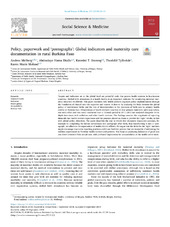| dc.contributor.author | Melberg, Andrea | en_US |
| dc.contributor.author | Diallo, Abdoulaye Hama | en_US |
| dc.contributor.author | Storeng, Katerini Tagmatarchi | en_US |
| dc.contributor.author | Tylleskär, Thorkild | en_US |
| dc.contributor.author | Moland, Karen Marie | en_US |
| dc.date.accessioned | 2019-05-22T11:34:59Z | |
| dc.date.available | 2019-05-22T11:34:59Z | |
| dc.date.issued | 2018-10 | |
| dc.Published | Melberg A, Diallo AH, Storeng KTS, Tylleskär T, Moland KM. Policy, paperwork and 'postographs': Global indicators and maternity care documentation in rural Burkina Faso. Social Science and Medicine. 2018;215:28-35 | eng |
| dc.identifier.issn | 1873-5347 | |
| dc.identifier.issn | 0277-9536 | |
| dc.identifier.uri | https://hdl.handle.net/1956/19690 | |
| dc.description.abstract | Targets and indicators set at the global level are powerful tools that govern health systems in low-income countries. Skilled birth attendance at a health facility is an important indicator for monitoring maternal mortality reduction worldwide. This paper examines how health workers negotiate policy implementation through the translation of clinical care into registries and reports. It does so by analysing the links between the global policy of institutional births and the role of documentation in the provision of birth care in primary health centres in Burkina Faso. Observations of health workers' practices in four primary maternity units (one urban, one semi-urban and two rural) conducted over a 12-week period in 2011–2012 are analysed alongside 14 in-depth interviews with midwives and other health workers. The findings uncover the magnitude of reporting demands that health workers experience and the pressure placed on them to provide the ‘right’ results, in line with global policy objectives. The paper describes the way in which they document inaccurate accounts, for example by completing the labour surveillance tool partograph after birth, thus transforming it into a ‘postograph’, to adhere to the expectations of health district officers. We argue that the drive for the ‘right’ numbers might encourage inaccurate reporting practices and it can feed into policies that are incapable of addressing the realities experienced by frontline health workers and patients. The focus on producing indicators of good care can divert attention from actual care, with profound implications for accountability at the health centre level. | en_US |
| dc.language.iso | eng | eng |
| dc.publisher | Elsevier | eng |
| dc.rights | Attribution CC BY | eng |
| dc.rights.uri | http://creativecommons.org/licenses/by/4.0 | eng |
| dc.subject | Maternal health | eng |
| dc.subject | Indicators | eng |
| dc.subject | Health policy | eng |
| dc.subject | Accountability | eng |
| dc.subject | Burkina Faso | eng |
| dc.title | Policy, paperwork and 'postographs': Global indicators and maternity care documentation in rural Burkina Faso | en_US |
| dc.type | Peer reviewed | |
| dc.type | Journal article | |
| dc.date.updated | 2019-02-18T11:04:47Z | |
| dc.description.version | publishedVersion | en_US |
| dc.rights.holder | Copyright 2018 The Author(s) | |
| dc.identifier.doi | https://doi.org/10.1016/j.socscimed.2018.09.001 | |
| dc.identifier.cristin | 1614158 | |
| dc.source.journal | Social Science and Medicine | |
| dc.relation.project | Norges forskningsråd: 223269 | |
| dc.relation.project | Norges forskningsråd: 220608 | |

